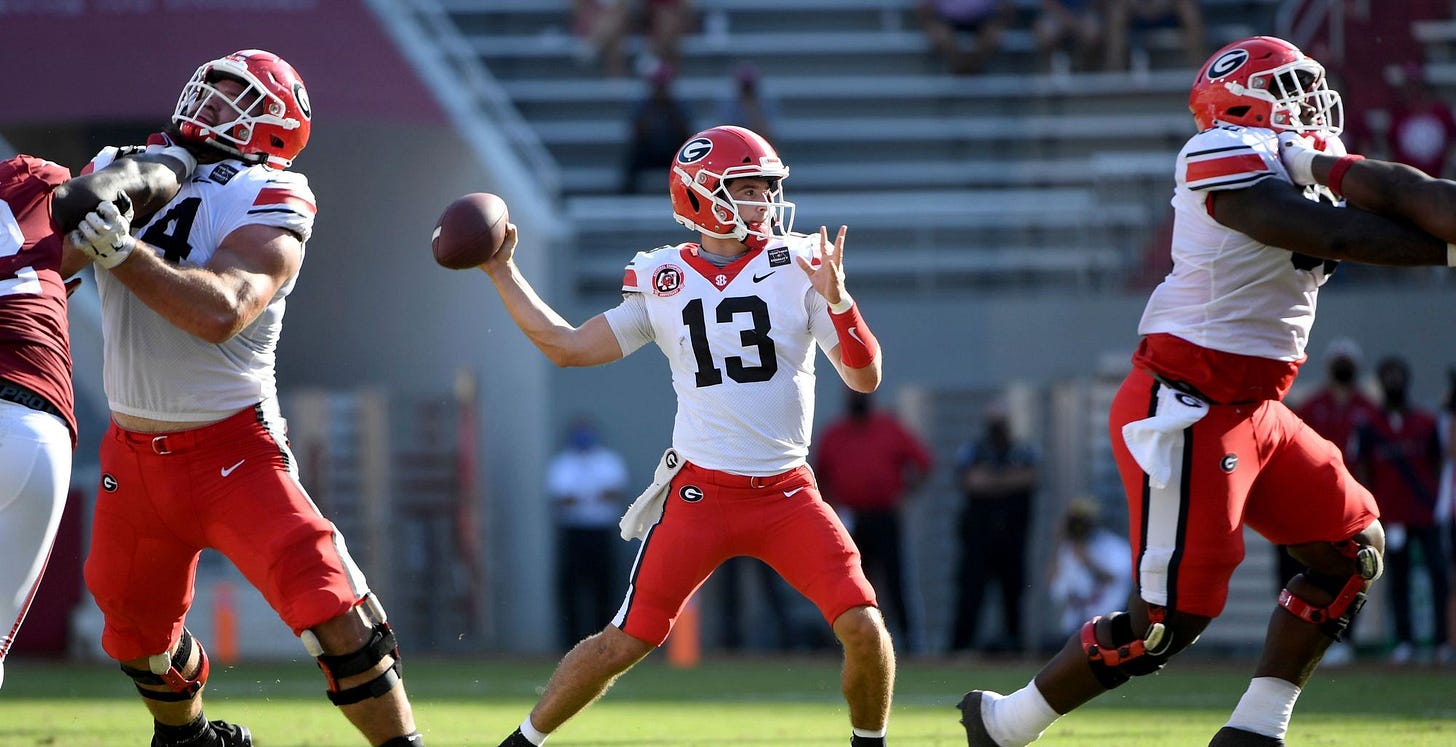Should the Heisman Trophy Winner be Dependent on Team Success?
Welcome to Blue Chip Journal by Adam Breneman - a weekly newsletter from Adam with analysis, hot takes and news on all things college football, NIL, recruiting & sports business. Subscribe now and join 22,000 other sports fans and share this newsletter with all the college football fans you know!
This email is sponsored by Pikkit: the best sports betting tracker and social media.
If you’re betting on football this season, you need to be using Pikkit. Pikkit is the best place to sync your sports books, track your bets, see the lines and talk to other bettors about favorite picks. And the best part is it’s free! If you use my code you get get free money too.
Click the link below and use my code ADAM for $3 or $100 FREE.
Should the Heisman Trophy Winner be Dependent on Team Success?
Hey friends,
Since we’re nearing the conclusion of the college football season, I wanted to put together some thoughts regarding the most prestigious, individualized award in sports — the Heisman Memorial Trophy.
For years, the honor has typically been bestowed upon the most impactful athlete on one of the nation’s most explosive units following each campaign.
In fact, the last Heisman victor on a team to not reach the College Football Playoff happened to be Lamar Jackson in 2016, who posted over 3,500 passing yards and exploded for 1,571 yards on the ground. Throughout the process, to dual-threat weapon led Louisville to a 9-3 regular season, followed by a Citrus Bowl defeat at the hands of LSU to round out his sophomore stint.
That season, Jackson was undoubtedly the best, most impactful, and most valuable player nationally for an otherwise lackluster Louisville squad. Amazingly, the Florida native accounted for 73.84% of the Cardinals’ total yards from scrimmage.
Comparatively, across Joe Burrow’s coveted Heisman campaign in 2019, the LSU gunslinger posted 6,055 yards of offense, equating to nearly 70% of the Tigers’ total output.
While Burrow’s fifth-year run is often talked about as the most impressive season-long stretch by a signal caller in college football history, Jackson actually proved to be more of an impactful asset to his squad from a statistical standpoint.
With just one week left in the regular season slate, several candidates have prevailed in potentially earning Heisman finalist recognition, which would warrant a spot at the award’s dramatic ceremony in New York City.
But, with playoff hopes dwindling for several groups, some of the most impactful pieces on resurgent programs might be left off the ballot simply due to a lack of sustained team-wide success.
Let’s take a look at Hendon Hooker, for example. Heading into Tennessee’s primetime road matchup with South Carolina, the Volunteers’ transcendent quarterback possessed the second-best betting odds to hoist the Heisman trophy at the season’s end.
After a 247-yard passing display highlighted by three touchdowns and zero turnovers, Hooker no longer resides as a top-12 Heisman favorite. While the Volunteers gave up 63 points and 606 total yards to Shane Beamer’s resurgent South Carolina group, Tennessee’s defensive shortcomings shouldn’t poorly reflect on Hooker’s potential to receive an individualized accomplishment.
Following his group’s second loss of the campaign, all while suffering a gruesome season-ending ACL tear, Hooker likely won’t end up as a Heisman finalist as Tennesse’s most prominent quarterback since Peyton Manning called the shots under center in 1997.
Hooker’s likely absence from New York as a Heisman finalist begs one, simple question — is the individual award actually dependent on team-wide success?
With that in mind, let’s look at the Heisman Memorial Trophy’s mission statement:
The Heisman Trophy is annually awarded to: “The [most] outstanding college football player whose performance best exhibits the pursuit of excellence with integrity. Winners epitomize great ability combined with diligence, perseverance, and hard work.”
As expected, the award’s clear-cut criteria makes no mention of team-based accomplishment. But, across the College Football Playoff’s eight-year inception, Jackson stands as the lone honoree to hoist the award without making the four-team dance.
On Tuesday, the College Football Playoff released its latest iteration of the weekly rankings heading into rivalry weekend. Out of the current top six teams, five have players listed as top-five betting favorites to win the Heisman.
Ohio State quarterback CJ Stroud currently leads the charge, with USC gunslinger Caleb Williams trailing in second place.
But, what if Ohio State outlasts Michigan behind a stout, defensive showing while Williams’ group falls to Notre Dame, despite a 300-yard, mistake-free passing performance?
If the scenario above were to come to fruition, Williams’ Heisman stock would almost certainly plummet solely due to the effective end of the Trojans’ playoff hopes. On the other hand, Stroud would have an inside track toward keeping the award on lock, even if he plays serviceably in an Ohio State victory.
Based on recent trends, it’s clear that the group of 870 media voters value final scores over personal efforts. Despite not willing their squads into playoff contention, Saquon Barkley (2017), Will Grier (2018), and Jonathan Taylor (2019) all deserved finalist distinctions at the crowning ceremony.
Moreover, if the goal of the Heisman is to gift the season-ending award to the main catalyst on the most dominant team, Stetson Bennett deserves far more respect than he’s currently receiving.
The former walk-on has thrown for the third-most yards amongst all SEC quarterbacks, a 67.6% completion percentage, and over a 2-to-1 touchdown to interception ratio. Additionally, the gutsy passer boasts a 24-1 record over his last 25 contests.
With so many skilled, generational players to choose from, the Heisman selection committee should ultimately value individual achievements over team success.
While the award should certainly be granted to a player who carried a distinct role in helping his group reach unique, overarching accomplishments, the honor shouldn’t be limited to pieces on only four playoff-caliber groups.
Although Hooker will not conclude his historical run on the field, or even by watching his teammates compete in the Peach or Fiesta Bowls for a national championship, his prowess should be rewarded in the form of a Heisman finalist distinction.
As it stands, Hooker ranks second in the SEC in passing yards, finished his Tennessee career with 58 touchdown tosses, and returned a longtime sleeping giant to national prominence.
The same sentiment holds true for Williams, who has the opportunity to will USC to its first-ever playoff appearance on the heels of a disastrous 4-8 regular season in 2021.
Currently, Williams sits as the third-leading passer in the PAC-12 with over 316 yards per matchup while pacing the conference in touchdowns, with 33 scores through the air in only 11 games.
Regardless of which program prevails as the eventual national champion, it’s important that individual successes should be rewarded independently of external factors.
If Hooker and Williams aren’t acknowledged for leading two previously dormant programs back into the national spotlight, the Heisman selection committee will wholeheartedly turn against its published purpose.
If you have any questions, comments, or feedback, please don’t hesitate to reach out to me by email at adam@brenemanmedia.com.
You can also find me on Twitter, Instagram, TikTok, LinkedIn or Facebook.
Shoutout to Connor Krause for helping to write this newsletter and putting the whole thing together!







